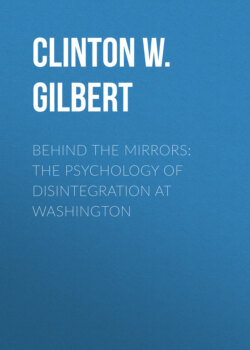Читать книгу Behind the Mirrors: The Psychology of Disintegration at Washington - Clinton W. Gilbert - Страница 3
На сайте Литреса книга снята с продажи.
FOREWORD
ОглавлениеTable of Contents
"A book like the Mirrors of Downing Street is well enough. It is the fashion to be interested in English notables. But that sort of thing won't do here. The American public gets in the newspapers all it wants about our national politicians. That isn't book material."
An editor said that just a year ago when we told him of the plan for the Mirrors of Washington. And, frankly, it seemed doubtful whether readers generally cared enough about our national political personalities to buy a book exclusively concerned with them.
But they did. The Mirrors of Washington became an instantaneous success. It commanded almost unprecedented attention. It was heartily damned and vociferously welcomed. By the averagely curious citizen, eager for insight behind the gilded curtains of press-agentry and partisanship, it was hailed as a shaft of common-sense sunlight thrown into a clay-footed wilderness of political pap. And close to one hundred thousand copies were absorbed by a public evidently genuinely interested in an uncensored analysis of the people who are running us, or ruining us, as individual viewpoint may determine.
The Mirrors of Washington was by way of being a pioneer, at least for America. Overseas, it is habitual enough to exhibit beneath the literary microscope the politically great and near-great, and even to dissect them—often enough without anæsthesia. To our mind, such critical examination is healthily desirable. Here in America, we are case-hardened to the newspapers, whose appraisal of political personages is, after all, pretty well confined to the periods of pre-election campaigning. And we are precious little influenced by this sort of thing; the pro papers are so pro, and the anti papers so anti, that few try to determine how much to believe and how much to dismiss as routine partisan prevarication.
But a book! Political criticism, and personality analyses, frozen into the so-permanently-appearing dignity of a printed volume—that is something else again! Even a politician who dismisses with a smile or a shrug recurrent discompliments in the news columns or the anonymous editorial pages of the press, is tempted to burst into angry protest when far less bitter, far more balanced criticism of himself is voiced in a book. A phenomenon, that, doubtless revisable as time goes on and the reflections of more book-bound Mirrors brighten the eyes of those who read and jangle the nerves of those who run—for office.
Behind the Mirrors is another such book. It delves into the fundamentals at Washington. It is concerned with political tendencies as well as political personalities. It presents what impresses us as a genuinely useful and brilliant picture of present-day governmental psychology and functioning. It is a cross section of things as they are.
The picture behind the mirrors is not as pretty as it might be. Probably the way to make it prettier is to let ample light in upon it so that the blemishes, discerned, may be rectified; and to impress those responsible for its rehabilitation with the necessity of taking advantage of the opportunities that are theirs.
When President Eliot of Harvard presented to a certain Senator an honorary degree, he described with inimitable charm and considerable detail that Senator's literary achievements; and then he mentioned his political activities, ending with substantially these words: "A man with great opportunities for public service still inviting him."
The invitation yet holds good. Acceptances are still in order.
G. P. P.
New York,
June, 1922.
